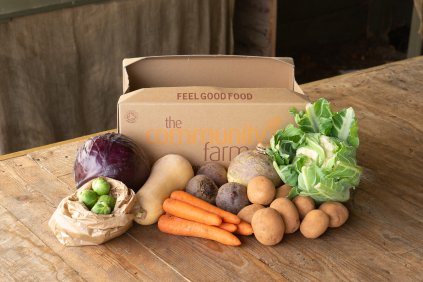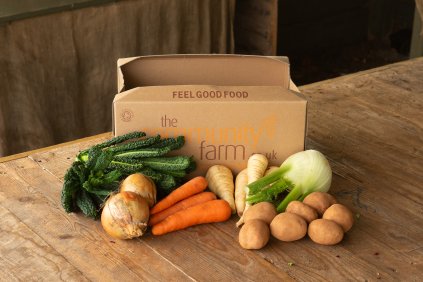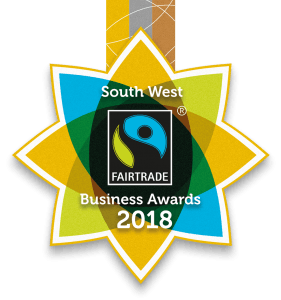A better food system is possible! Food production, transportation and packaging is a huge contributor to the climate crisis. But it doesn’t have to be that way. The food system can be regenerative; not only minimising its impact but giving nature space to flourish, helping restore biodiversity and locking carbon up in the soils. Led by the principles of organic, we are doing all we can to deliver delicious, climate-friendly food that nourishes people and planet.
Read on to find out what we’re doing to deliver that promise. We know we’re not perfect and we’re constantly working hard to improve, but by buying food from us, you can rest assured that your food shopping doesn’t cost the Earth.
Organic
Non-organic farming uses chemicals which release greenhouse gases when they’re produced and when they break down. If the whole of Europe moved over to organic food production, agricultural emissions could drop by up to 50%! Those same chemicals also disrupt biodiversity and the Earth’s natural processes which are vital for keeping our climate cool.
We farm organically and manage our hedgerows, field margins and buildings in a way that encourages biodiversity. Some of our crops are also grown in ‘no dig’ beds which helps lock carbon in the soils, helping to reduce global heating.
In fact, all fruit and veg that you buy from us will be organic. Very occasionally we stock other items which are not certified as organic but meet very high environmental standards in their production, as certification isn’t always possible, especially for small businesses (check out this article on Black Bee Honey for a good example). If we have sourced from a non-certified supplier, we’ll always let you know.
Local
Local food needs less transportation and packaging to make it from the field to your front door. It also tends to be fresher which means it will last longer, helping to reduce waste.
Our sourcing policy is local-first. We start with the produce grown on our own fields and then work our way out until we can deliver a great variety of produce to all our customers. Beyond our 15 acres, we prioritise other small farmers in the South West, then small businesses from further afield in the UK, and only when we’ve exhausted all of the great options in this country will we look to import produce. When we do have to import, we follow the same logic and source it from as nearby as possible and never fly it in. Of course, our Gert British box is always 100% British if you want to stay local all year round.
Seasonal
Growing food out of season requires energy-intensive heating of greenhouses or heavy reliance on inputs to make it work. Fossil-fuel heated indoor spaces used to grow crops out of season can even end up with a bigger carbon footprint than flying crops to the UK from abroad, so that’s an absolute no-no for us. We do supplement our boxes with imported veg when UK produce is low so that we can keep up the variety in the boxes, but that is seasonal too.
On our own fields, we use polytunnels to help extend the growing season and bring our customers great tasting produce for as long as possible, but we don’t heat them up. Instead, we find joy in choosing food in season. Nothing gets us excited quite like the first of the summer’s tomatoes or those spicy winter salad leaves!

Veg-led
Meat has a big impact and lots of us are trying to cut down. That’s why we focus on veg boxes. We hope to provide plenty of variety in the boxes to keep your fridge full of enough delicious options to make cooking with veggies a treat, all year round.
The meat we do sell is local and is certified to high environmental standards, as that also reduces its impact on the climate.
Minimising food waste
8% of all global greenhouse gas emissions come from food waste, so getting the most out of what we have (rather than growing, transporting and packaging more) can make a big difference.
Veg boxes make a big dent in the food waste that most retailers have to contend with. That’s because we can work with local producers to choose what goes in the boxes each week, and ensure we sell everything they’ve grown, as well as making sure food is never just sat on a shelf waiting for someone to buy it. Careful crop planning for the fields, and good communications between the growing team and warehouse team means we minimise waste from our fields.
If there’s anything that’s grown and not fit for sale, our volunteers often eagerly take it home too. But we don’t let ugly produce go to waste. We take pride in the fact that some of our vegetables are wonky. We still sell them, as they are perfectly tasty! On the few occasions where we have surplus, we call on food projects or food banks to help us find the produce a new home. We even have business customers who make soup, jam or preserves from surplus or damaged fruit and vegetables. Our website is bursting with recipes to help you make the most of the seasonal produce in the boxes.
Minimising packaging
Aside from the negative impacts of packaging on biodiversity and the natural world, all packaging has a carbon footprint and so the less of it, the better.
First and foremost, we don’t buy in, wrap or package products unnecessarily. Our shorter supply chain, both locally and abroad (where we work directly with growers), allows us to minimise the need for wrapped vegetables and fruit, such as peaches, nectarines and cucumbers.
Sadly, food and farming rely heavily on the use of plastic to maintain freshness and product quality. Without plastic, greens like chard and spinach will quickly wilt and rot. There is therefore a balance to strike in minimising food waste and packaging waste.
We are constantly working hard to explore the latest technologies and find ways of minimising the amount of packaging in our boxes. We are proud that most of our produce avoids plastics. For those few items that do need packaging, we currently use plastic that we can recycle. All you need to do is pop it back into the box for collection and we’ll do the rest. For more information on our approach to packaging, check out the Waste Not page on our website.

Investing our surplus back into local people and wildlife
Any surplus that we make from our food sales is reinvested back into programmes designed to improve the health of local people and wildlife. That helps us care for the land and build relationships between people and the natural world which we need in order to work together to overcome the climate crisis.
Here are some of our favourite local producers who are working hard to produce climate-friendly food:
Strode Valley Organics: A small, idyllic market garden in the Chew Valley producing delicious, organic salad and vegetables. Their no-dig soil management of the market garden helps store carbon and they are re-wilding much of the rest of the farm. Their fantastic produce is used by some top restaurants in the area and only a few retailers, so snap it up if you see it on our website!
Story Butchers: Meat has a big impact and lots of us are trying to cut down. But not all meat is created equal. Not only is the meat from Story Butchers local, but it's pasture-fed too, meaning it has less of an impact on the climate than grain-fed meat. That natural diet also makes for phenomenal flavour. Order one of their meat boxes via our website to try it for yourself.
Bath Culture House: Taking produce from local producers (including our farm) to make incredible ferments like sauerkraut, kimchi and kombucha. Healthy, tasty and a great way of preserving food so it’s not wasted, too!














